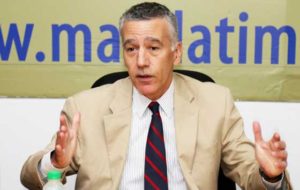AFTER nearly two years in one of the top posts in the American foreign service, Ambassador Philip Goldberg is ending his tour of duty with an assurance that the United States will protect the Philippines from any threat.
“Our alliance is firmly invested in protecting the prosperity, security and peace in the region and a partnership between two sovereign partners,” Goldberg said in his speech Wednesday night during the Fourth of July celebrations in Makati City.
Goldberg is exiting as the new administration of President Rodrigo Duterte makes a pivot toward China to try to settle the West Philippine Sea (South China Sea) territorial disp ute, in contrast to the pro-US stance of the previous Aquino government.
But Goldberg said the Philippines could always count on the US for help, given existing agreements such as the Mutual Defense Treaty and the Enhanced Defense Cooperation Agreement.
“That alliance is based on our shared commitment to democracy, the rule of law and the peaceful settlement of disputes. As allies we stand together whenever the other is threatened and we will always continue to do so,” he said.
The 59-year-old US envoy also said goodbye and took pride at having visited several places in the Philippines.
“This will be my last July 4th in the Philippines so I want to say that I’ve been all around from Ilocos Norte to Tawi Tawi, from the mountains of Benguet to the tuna market in General Santos City, Mindanao,” Goldberg said.
“I’ve seen the awe-inspiring beauty and unique character of your country, but above all, it is the warmth and the welcome of the Filipino people that I will remember most,” he said.
Goldberg was appointed in November 2013 to succeed Harry Thomas. He will be replaced by Sung Kim, Washington’s special representative for North Korea policy and a former envoy to South Korea.
Kim, who will be the first Asian-American appointed to the Manila post, was nominated as the new US ambassador to the Philippines by President Barack Obama in May.
Ties between the Philippines and the US have grown closer in recent years in terms of people-to-people exchanges, economic relations and security, Goldberg said.
But the warm ties should continue amid new challenges in the Asia-Pacific region, he said.


